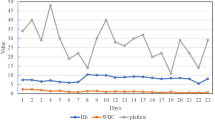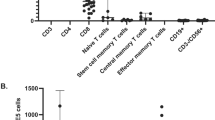Abstract
Neutropenic infections are the major cause of morbidity and mortality in the treatment of aplastic anemia (AA) with antilymphocyte globulin (ALG), cyclosporin A (CSA), and methylprednisolone (MP). Recent data suggest a beneficial effect of administering G-CSF as an adjunct to immunosuppression. We have treated 11 consecutive patients with AA using a combined immunosuppressive regimen including ALG, CSA, and MP plus G-CSF at a dose of 5 μg/kg/day until neutropoietic recovery. In addition to measuring routine hematological parameters we have performed serial determinations of reticulocyte counts and in vitro progenitor cell cultures before and after therapy in order to assess their predictive value for treatment response and to determine the impact of therapy on early hematopoiesis. One patient died on day 34 of neutropenic septicemia. At 1 year, 81% of patients showed response to treatment. The median time to ANC values >0.5 and >1.0×109/l were 19 and 35 days, respectively. Reticulocyte counts started to recover after 6 weeks, and transfusion independence was observed on day 52 for red blood cell transfusions and on day 53 for platelet concentrates. All patients with detectable colony formation in peripheral blood achieved a complete hematological remission, as compared with only one of five patients without progenitor cell growth. Although normal ranges were rarely achieved, there was a small but definitive improvement in progenitor cell numbers as compared with baseline values in most patients. Our results confirm the good tolerability and high efficacy of this G-CSF-supported combined immunosuppressive therapy for AA. Detectable colony growth at diagnosis seems to predict a high chance for complete hematological response.
Similar content being viewed by others

Author information
Authors and Affiliations
Additional information
Received: July 2, 1998 / Accepted: March 3, 1999
Rights and permissions
About this article
Cite this article
Meidlinger, P., Knöbl, P., Jäger, U. et al. Granulocyte colony-stimulating factor-supported combined immunosuppressive therapy (antilymphocyte globulin, cyclosporine, and methylprednisolone) in patients with aplastic anemia: tolerability, efficacy, and changes in the progenitor cell compartment. Ann Hematol 78, 299–304 (1999). https://doi.org/10.1007/s002770050519
Issue Date:
DOI: https://doi.org/10.1007/s002770050519



